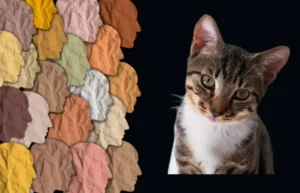Can Cats Be Racists? Discover 3 Facts Behind Cat Preferences

Our lovely cats have been enchanting us with their poise, mystique, and grace for generations now. These complex beings have unique perceptions and instincts that have helped them thrive both in the wild and presently, as our beloved pets, It’s crucial to recognize that gaining insight into feline behavior is key to creating meaningful moments with your pet.
By honing in on their unique habits and tendencies, you’ll be able to understand why they do certain things.
In this article, we will address some common misconceptions concerning “Can cats be racists?”, we will be exploring how you can distinguish fear from discrimination,
Table of Contents
- Understanding The Science Behind Cat Preferences
- Can Cats Be Racists?
- Encouraging positive socialization in cats
- Addressing and Resolving unwanted Behaviors
- Are Cats Racist? Final Thoughts
Understanding The Science Behind Cat Preferences
You may be gobsmacked at why your cat will prefer your roommate over you, or why they gravitate toward certain objects like pipe cleaners, or places( while taking them on a walk without a leash). Our cats just enjoy having their preferences, and understanding the science of why they act this way can help you connect deeper with them.
Scent Recognition and Associations
The scent recognition of cats is much more powerful than humans, and this plays a role in how our furbabies perceive the world around them. Their nose is used to gather information about their environment, and scents can bring back memories or emotions.
For instance, your cat is going to associate the scent of a person who gives it treats and cuddles with a positive experience. While unfamiliar scents or the scent of a person who bullies or doesn’t care about the cat might make the cat uncomfortable or fearful. Paying attention to how your cat reacts to diverse scents will give you rich insights into your cat’s preferences.
Familiarity and Trust
Cats prefer familiar people and surroundings: this show that trust play a very big role in how they develop their bonds and relationship, which takes time to build. Once a cat feels comfortable and secure with a person, it will likely be affectionate and sociable with that person.
Giving the cat time and space to develop this trust in their own time is very essential. Routine or overall consistency in the interactions with your cat always goes a long way in establishing strong bonds.
Past Experiences Shaping Behavior
Just like we, humans, a cat’s past experiences plays a huge role in shaping how they behave and decide its preferences. A positive experience with a person with a certain feature or personality( appearance, scent, voice, or mode of affection) might influence how receptive your cat will be to other people with those similar characteristics.
Likewise, a negative or traumatic experience will cause your furbaby to become fearful and constantly try to avoid people who remind it of those events or unkind acts. It is paramount to know your cat’s history to help you proactively deal with potential triggers with patience and sensitivity.
Can Cats Be Racists?
Sometimes, people ignorantly associate the reactions of their cat to people of diverse ethnicities or backgrounds, with being “racist,” but in reality, the cat is just being afraid(as a result of lack of socialization, or as a result of a past bad experience) or influenced by the owner’s beliefs or actions around people of such ethnicities. below we will explore the reasons behind this seemingly racist behavior of your cat.
Distinguishing Fear From Discrimination
For you to say a cat is racist, means your cat understands the concept of race– which is not true, as they are incapable of comprehending the concept. What we deem as racist behavior is just fear and unfamiliarity. As we uncovered to you earlier, cats are reliant on their scent recognition and past experiences while interacting with people.
If your cat wasn’t socialized properly and has limited exposure to people from different backgrounds, it might feel uneasy and scared at the sight of someone new. You should understand that this isn’t a reaction of discrimination, but rather, it is an inherent instinct of taking caution in unfamiliar situations; just like when they see a flame.
Influence of Owner Behavior and Beliefs
Cats, or our pets in general can be incredibly perceptive and can pick up on our behaviors and emotions. If you, as a cat owner, display signs of not being comfortable or showing tension while you see certain people, your cats may equally pick up the signals and become cautious around such people.
” Cats integrate visual and auditory signals to recognize human and conspecific emotions and they appear to modulate their behavior according to the valence of the emotion perceived” According to Pubmed.
Having noted that it is important to be cautious of your biases around your cat, as they could inadvertently influence their behavior. Being open and welcoming to people of different backgrounds, and ethnicity, will make your cat learn the same.

Cultural Misunderstanding
Cats can also be sensitive to differences in cultures, such as the clothes they wear, scents, or body language. For example, if your cat has never seen someone wearing a head scarf or a hat, they would have an apprehensive disposition towards that person initially.
It is essential to recognize that these reactions are not a result of your cat being racist, but rather a response to something they are not used to. Exposing your feline friend to a diverse range of people and experiences is key in helping them become more receptive and adaptable.
Encouraging positive socialization in cats
Cultivating positive socialization in your furbaby is pivotal in ensuring you have a well-adjusted, confident, and friendly cat as they grow. You can use the below strategies to aid your cat become more receptive to diverse situations and people.
Importance of early socialization
socialization is a non-negotiable aspect of a cat’s development, especially at the early stages of their lives. Between the ages of 2 and seven weeks, kittens are more open to learning new things and experiences, making it a perfect window to introduce a variety of sounds, people, sights, and scents. Exposing them to different environments and people will help them grow into more confident, adaptable, and less fearful cats.
It is crucial to aid your cat’s calm and confident interaction with new individuals with rewards in the form of treats, praise, or affection, and as time goes on, gradually increase the level of complexity in their social encounters.
Addressing and Resolving unwanted Behaviors
What may have brought you to this topic is certainly your cat’s display of unwanted behaviors such as fear or aggression towards certain people, and the below guide can help you resolve this issue.
Identifying the Root cause
Start by examining The underlying cause of the behavior. Take into consideration factors such as the cat’s past experience, environmental triggers, and unfamiliarity. It is important to connect with the perspective of your cat with an understanding that their undesired behaviors stem from an instinctual response and not like they have a planned out malicious intent to unleash.
Behavior modification Technique
After identifying the cause, all you need do now is to employ behavior modification techniques to aid your cat get over their fears and anxieties. Desensitization and counter-conditioning are my best go-to methods for addressing unwanted behaviors and they are super effective.
It works like this: Desensitization is a situation whereby you gradually introduce your cat to those things that trigger it, while the work of the counter-conditioning is to pair the triggers with a positive stimulus like treats(freeze-dried beef liver, lick mat treats, or your cat’s preferred treats) or praise, to create a new positive association.
Seeking The Help Of A Professional
If the unwanted behavior persists or becomes even worse, it’s time to seek the help of a vet or a certified animal behaviorist. They will provide the best valuable guidance to help get your cat on track.
Are Cats Racist? Final Thoughts
Cats are not racist, you only need a better understanding of your cat’s behavior and the factors that determine their reactions and preferences.
By employing positive socialization, exposing the cat to different experiences, and addressing unwanted behaviors, You can help your furbaby become more receptive to new people, and situations, and less fearful.



